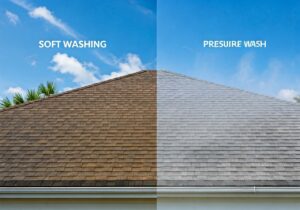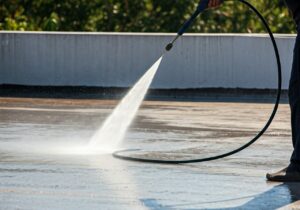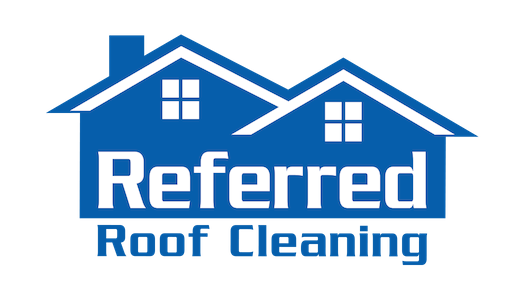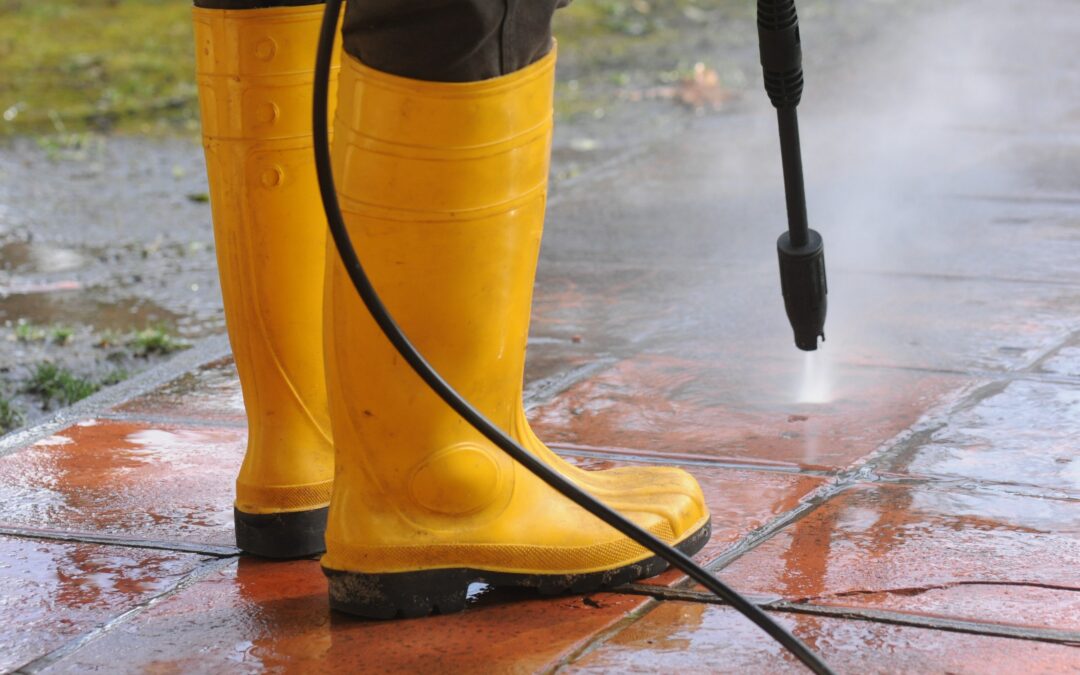Keeping your roof clean and in good shape is very important for every homeowner. Regular roof cleaning makes your home look better and protects your investment by avoiding damage. When deciding on the best roof cleaning method, many homeowners wonder what is better: soft wash vs pressure washing? This blog post will look at the differences between each method. It will help you make a good choice for your needs.
Regular roof cleaning is very important to keep your roof strong and lasting. There are two main ways to clean your roof: soft wash and pressure washing. By looking at these methods, homeowners can choose the best one for their needs. Both soft wash and pressure washing can help keep your roof in great shape. However, knowing how they differ is key to picking the right method.

Understanding Roof Cleaning Challenges:
Cleaning your roof can be tricky. You need to be careful and think about the best way to do it. Roofs can get damaged easily if you use the wrong tools or methods. Also, the kind of roofing material you have is very important when choosing how to clean it.
It’s essential to understand these challenges. This helps you pick a cleaning method that gets rid of dirt and grime without hurting your roof.

The Impact of Neglecting Roof Maintenance
Neglecting to take care of your roof can cause big problems. It can affect how your home looks and how strong it is. Dirt, algae, and moss can build up, creating streaks and dark spots. This makes your home less appealing from the outside.
Even more importantly, these substances can damage the roofing material. This can lead to erosion, water damage, and expensive repairs. Moss holds moisture, which helps mold and mildew grow, and it can also bring insects.
Doing regular roof cleaning can help avoid these problems. It will make your roof last longer and protect your investment.
Common Roof Cleaning Mistakes to Avoid
When cleaning your roof by yourself, you might make mistakes that can hurt your roof or make it dirty again. One common mistake is using high-pressure washing on weak roofing materials, like asphalt shingles. The strong water pressure can wash away the granules. This can make your roof more likely to leak and age quickly.
Another common mistake is using harsh chemical cleaners. These can hurt the roofing material and harm the environment. Safety is also very important when working on your roof.
Don’t clean on wet or windy days. Always use proper safety gear, like a strong ladder and a safety harness.
What Is Soft Wash Roof Cleaning?
Soft washing is a gentle and effective way to clean roofs. It uses low-pressure water along with special cleaning solutions to get rid of dirt, algae, moss, and other harmful materials. This method focuses on using biodegradable and eco-friendly cleaners. These cleaners break down grime without harming your roofing material.
Soft washing is great for delicate roofing materials like asphalt shingles, wood shake, and slate. The low pressure helps the cleaning solution reach deep into small spaces. It kills algae and moss at their roots, which stops them from coming back. Using this method not only cleans your roof but also helps it last longer.
Soft washing is a gentle way to clean roofs. It uses a low-pressure water spray and safe, biodegradable solutions to remove dirt, algae, and moss. This method is perfect for delicate roofing materials like asphalt shingles and clay tiles. It is an eco-friendly option that helps protect roofs from damage and can make them last longer. Soft washing is a safe and effective choice for keeping your roofing material clean and in good shape.
What Is Pressure Washing for Roof Cleaning?
Pressure washing, or power washing, is a way to clean roofs using strong water sprays. This method can easily remove dirt, debris, and other unwanted items. It works well for getting rid of tough stains and build-up, making it a popular choice for cleaning hard surfaces. But be careful! Pressure washing can be too strong for soft roofing materials. If not done the right way, it can damage your roof.
Pressure washing, or power washing, uses a strong water spray to get rid of dirt, moss, and debris from different roofing materials. This method typically works well on tough surfaces like concrete and metal roofs. By applying a lot of force, pressure washing provides a deep clean. This makes it a great choice for freshening up outdoor areas. The high-powered stream can quickly remove dirt and stains, giving homeowners fast and effective cleaning results.
High-pressure water spray, typically ranging from 1500 to 3000 psi, is a highly effective method for removing dirt, moss, and debris from various surfaces. This cleaning technique is commonly employed on materials such as concrete, metal, and durable roofing materials due to its ability to efficiently blast away accumulated grime. The forceful water pressure can penetrate stubborn stains and contaminants, restoring surfaces to their original cleanliness.
When using a high-pressure water spray for cleaning purposes, it is essential to adjust the pressure settings based on the surface being cleaned to prevent damage. Additionally, employing appropriate nozzles and techniques can enhance the efficiency of the cleaning process while ensuring optimal results.

Regular maintenance with high-pressure water spray not only enhances the aesthetic appeal of surfaces but also helps prolong their longevity by preventing the build-up of harmful substances that can deteriorate materials over time. Properly executed high-pressure cleaning can rejuvenate outdoor spaces, driveways, walkways, and other surfaces, contributing to a well-maintained and visually appealing environment.
Key Differences Between Soft Wash and Pressure Washing
When it comes to cleaning roofs, the methods of soft wash and pressure washing differ significantly in their approach. Understanding these variances is essential in selecting the most suitable method based on the roof material and cleaning requirements. Soft wash involves using low pressure and mild solutions that are gentle on delicate materials, making it ideal for roofs that require a more cautious approach. On the other hand, pressure washing utilizes high-pressure water to remove dirt and grime, offering a more powerful cleaning solution that may not be appropriate for all types of roofing materials.
Soft wash relies on biodegradable cleaning solutions that are environmentally friendly and safe for delicate roofs like asphalt shingles and clay tiles. In contrast, pressure washing is better suited for tougher surfaces such as metal and concrete, where a stronger cleaning method is necessary. While soft wash poses minimal risk to the roof’s integrity, pressure washing can potentially cause damage to shingles if not handled properly.
In terms of effectiveness, soft wash provides long-lasting results due to its thorough yet gentle cleaning process. Conversely, pressure washing delivers immediate results in removing dirt and stains but does not necessarily prevent regrowth of contaminants over time. Therefore, understanding the specific needs of your roof and choosing the appropriate cleaning method between soft wash and pressure washing can ensure both a clean surface and the preservation of your roof’s longevity.
| Feature | Soft Wash | Pressure Washing |
| Water Pressure | Low pressure (100-300 PSI) | High pressure (1500-3000 PSI) |
| Cleaning Agent | Uses biodegradable cleaning solutions | Uses high-pressure water only |
| Best For | Asphalt shingles, clay tiles, and delicate roofs | Metal, concrete, and durable surfaces |
| Risk Factor | Safe for roofing materials | May cause damage to shingles |
| Effectiveness | Long-lasting results | Immediate but may not prevent regrowth |
Pros and Cons of Soft Wash Roof Cleaning
Picking the best way to clean your roof comes down to knowing its pros and cons. Let’s take a look at the strong points and weak points of soft wash roof cleaning. This will help you make the right choice.
Benefits of Soft Wash Roof Cleaning
Check out the benefits of soft washing, which offers a safe, effective clean without damaging surfaces. It provides long-lasting results, protects your home’s exterior, and is environmentally friendly.
- Gentle and Safe Cleaning: Soft washing uses low pressure and eco-friendly solutions, making it safe for delicate surfaces like wood, stucco, and vinyl.
- Long-Lasting Results: It kills algae and mold at their roots, preventing regrowth and reducing the need for frequent cleanings.
- Prevents Structural Damage: Unlike pressure washing, it avoids forcing water into cracks or under siding, preventing long-term damage.
- Eco-Friendly and Safe for the Environment: Soft washing uses biodegradable cleaning agents that are safe for plants, pets, and people.
- Cost-Effective in the Long Run: By reducing the frequency of cleanings, soft washing saves homeowners time and money over time.
- Enhances Curb Appeal: It removes dirt, mold, and mildew, improving the appearance and overall curb appeal of your home.
Pros of Soft Wash Roof Cleaning
- Soft washing, a gentle roof cleaning technique that involves soft wash roof treatment, offers several benefits for homeowners.
- One of the primary advantages of soft washing is its safety for shingles and tiles. Unlike traditional pressure washing methods that can damage roofing materials, soft washing effectively removes dirt, moss, and algae without causing harm.
- Furthermore, soft washing helps prevent the regrowth of moss and algae on roofs. By using eco-friendly cleaning solutions, this method not only cleans the roof but also contributes to environmental sustainability.
- Additionally, soft washing extends the lifespan of the roof by eliminating harmful contaminants and maintaining its structural integrity over time.
- Overall, soft washing is a cost-effective and efficient way to keep your roof clean and well-maintained while prioritizing both the safety of your property and the environment.
Cons of Soft Wash Roof Cleaning
- Results take longer to be visible: While hemp seed oil offers numerous health benefits, it may take some time before noticeable results are seen. Consistent and long-term use is often required to experience the full effects.
- Professional application for optimal results: To maximize the benefits of hemp seed oil, it is recommended to seek advice from a healthcare professional or a nutritionist who can provide guidance on dosage and usage tailored to your specific needs.
- Occasional reapplication may be necessary: Depending on individual factors such as skin type and health conditions, occasional reapplication of hemp seed oil may be needed to maintain its effectiveness. It’s essential to monitor your skin’s response and adjust usage accordingly for optimal results.
Pros and Cons of Pressure Washing for Roof Cleaning
Pressure washing, or power washing, is a common way to clean surfaces. However, when it comes to roof cleaning, you need to think carefully about whether it’s right for your roofing material. Here are the pros and cons to help you decide.
Benefits of Pressure Washing
Pressure washing is a highly effective method for cleaning various surfaces, and when it comes to roof power washing and high-pressure cleaning, the benefits are numerous.
- Enhanced Curb Appeal: One of the primary benefits of pressure washing is the instant boost in curb appeal it provides. Whether it’s your home’s exterior, driveway, deck, or roof, removing dirt, grime, mold, and mildew can make a significant difference in how your property looks.
- Preventative Maintenance: Regular pressure washing can help prevent long-term damage to surfaces. For roofs specifically, power washing can remove moss and algae that could deteriorate shingles over time.
- Increased Property Value: A clean and well-maintained property commands a higher value in the real estate market. Pressure washing not only enhances the aesthetics but also preserves the quality of different surfaces.
- Healthier Living Environment: Mold, mildew, algae, and other contaminants not only look unsightly but can also pose health risks. High-pressure cleaning effectively removes these harmful substances, promoting a healthier living environment for you and your family.
- Cost-Effective Solution: Compared to costly repairs or replacements due to neglect or damage caused by dirt buildup, pressure washing is a cost-effective maintenance solution that can prolong the lifespan of various surfaces.
- Environmentally Friendly: Using water at high pressure eliminates the need for harsh chemicals in many cleaning scenarios, making pressure washing an eco-friendly cleaning option.
- Efficient Cleaning Process: High-pressure cleaning can tackle stubborn stains and grime quickly and efficiently, saving you time and effort compared to traditional cleaning methods.
Pros of Pressure Washing
- Pressure washing is a highly effective cleaning method that offers numerous benefits. It provides instant removal of dirt, moss, and stains from various surfaces, making it an ideal choice for tough materials like metal and concrete.
- One of the major advantages of pressure washing is that it eliminates the need for chemical solutions, making it an environmentally friendly cleaning option.
- Additionally, pressure washing can help save time and effort compared to traditional cleaning methods, as it delivers powerful and efficient results with minimal manual labor required.
- This technique is versatile and can be used for a wide range of applications, including cleaning driveways, decks, sidewalks, and even vehicles.
- Overall, pressure washing is a convenient and efficient way to maintain the cleanliness and appearance of different surfaces.
Cons of Pressure Washing
- Pressure washing your roof might seem like a quick fix for removing dirt and debris, but it can actually cause more harm than good.
- The high pressure from the washer can potentially damage shingles and tiles, leading to costly repairs or replacements.
- Moreover, the forceful water stream can be strong enough to penetrate under the roof, causing leaks and water damage inside your home.
- Another drawback of pressure washing is that it does not address the root cause of issues such as algae or moss growth on your roof. While it may temporarily remove visible growth, it does not prevent these organisms from regrowing in the future.
- Instead, investing in professional roof cleaning services that use gentle yet effective methods can provide longer-lasting results without risking damage to your roof’s structure.
Which Roof Cleaning Method Should You Choose?
Picking the right way to clean your roof mostly depends on the type of roof you have, how dirty it is, and how much money you want to spend. It’s a good idea to talk to a professional roof cleaning service. They can look at your roof and suggest the best steps to take.
When it comes to choosing the best method for cleaning your roof, several factors need to be taken into consideration. If your roof is made of asphalt shingles, clay tiles, or other delicate materials, opting for a soft wash method is advisable to prevent any damage. On the other hand, if you have a concrete or metal roof, using pressure washing can effectively remove dirt and grime.
It’s essential to consider the climate in your area, the current condition of your roof, and the long-term maintenance costs associated with each cleaning method. While some homeowners prefer the DIY approach to save money, hiring a professional roof cleaning service is often recommended. Professionals have the expertise and equipment to clean your roof safely and effectively, ensuring that no damage occurs during the process. Additionally, they can identify any potential issues with your roof and address them promptly.
Regular roof maintenance not only enhances the curb appeal of your home but also extends the lifespan of your roof. By investing in professional roof cleaning services, you can ensure that your roof remains in top condition for years to come.
Pressure washing works well for concrete or metal roofs. This is especially true in places with different weather conditions. Think about your roof’s condition and future maintenance costs when choosing how to clean it. It’s better to hire professional roof cleaning services instead of trying to do it yourself. This way, you can make sure your roof gets a safe and complete clean.
Why Choose Our Roof Cleaning Services?
At Referred Roof Cleaning, we know that your roof is an important investment. Taking care of it is key to protecting your home and boosting its appearance. We are dedicated to offering great roof cleaning services that fit your needs. Our goal is to make sure you are happy with the results.
Tailored Cleaning Approaches for Every Roof
We know that each roof is special. It needs a unique way to be cleaned. Our skilled team looks at your roof’s type, condition, and how dirty it is. Then, we choose the right cleaning method, whether it’s soft washing or pressure washing, to get the best results.
We use top-quality, biodegradable cleaning solutions and the latest equipment. This way, your roof gets the care it needs without harming its structure or the environment.
Our Commitment to Eco-Friendly Solutions
At Referred Roof Cleaning, we care about the environment. This is why we focus on using eco-friendly cleaning solutions. Our products are biodegradable and safe for your plants, pets, and the Earth.
We use cleaning methods that work hard on dirt, grime, algae, and moss. At the same time, these methods are kind to your roof and the environment. We aim to provide cleaning solutions that are good for our customers and also for the planet.
Conclusion
Soft washing is great for gentle roofing materials like asphalt shingles and clay tiles. It uses low pressure and safe, eco-friendly solutions to stop moss and algae from coming back. In contrast, pressure washing uses a strong water spray and works well for tough surfaces like metal and concrete. If you want to protect delicate roofs, go for soft washing. If you need to remove dirt quickly from strong surfaces, pressure washing is the way to go. It’s a good idea to talk to professionals about the best method for your roof type and its maintenance needs.
Soft wash is the best option for gentle roofing materials like clay tiles and asphalt shingles. It uses low-pressure water spray, which lowers the chance of damage. Pressure washing works better for tough surfaces such as metal and concrete. It uses a high-pressure cleaning method. It is a good idea to talk to a professional. They can help you find the right method for your roof type. This will help you get the best results and keep your roof well-maintained for a long time.
In conclusion, when choosing between soft wash and pressure washing for roof cleaning, you should think about the type of roof you have and how much cleaning it needs. Soft wash is gentle and perfect for fragile roofs like asphalt shingles and clay tiles. On the other hand, pressure washing works well for stronger surfaces like metal and concrete. To get the best results and avoid harming your roof, it’s a good idea to consult a pro cleaning service. If you want custom cleaning methods and eco-friendly options, reach out to our roof cleaning services today for a safe and effective solution.
Frequently Asked Questions
Which method is safer for cleaning delicate roofing materials?
Soft washing is a safer way to clean delicate roofing materials. It uses a gentle method and special solutions to remove dirt, grime, and algae. This process does not damage the material.
Which method is more effective in removing tough stains and grime from a roof?
Pressure washing works well to remove tough stains and dirt because of its strong water spray. It’s important to talk to a professional to see if it suits your roofing material.
Are there any environmental considerations to take into account when choosing between soft wash and pressure washing for roof cleaning?
Soft washing is usually seen as the better choice for the environment. This is because it uses biodegradable cleaning solutions. These solutions have little effect on the environment.
What are the potential risks or damages associated with pressure washing a roof?
Pressure washing can harm sensitive roofing materials. This may result in broken tiles, cracked shingles, and leaks. It’s important to talk to skilled experts. They can determine if pressure washing is right for your roof.
What is the difference between soft wash and pressure washing for roof cleaning?
The main difference is in the water pressure and the cleaning solutions used. Soft washing uses low-pressure water along with biodegradable solutions. On the other hand, pressure washing uses high-pressure water to get rid of dirt and other contaminants.


Recent Comments